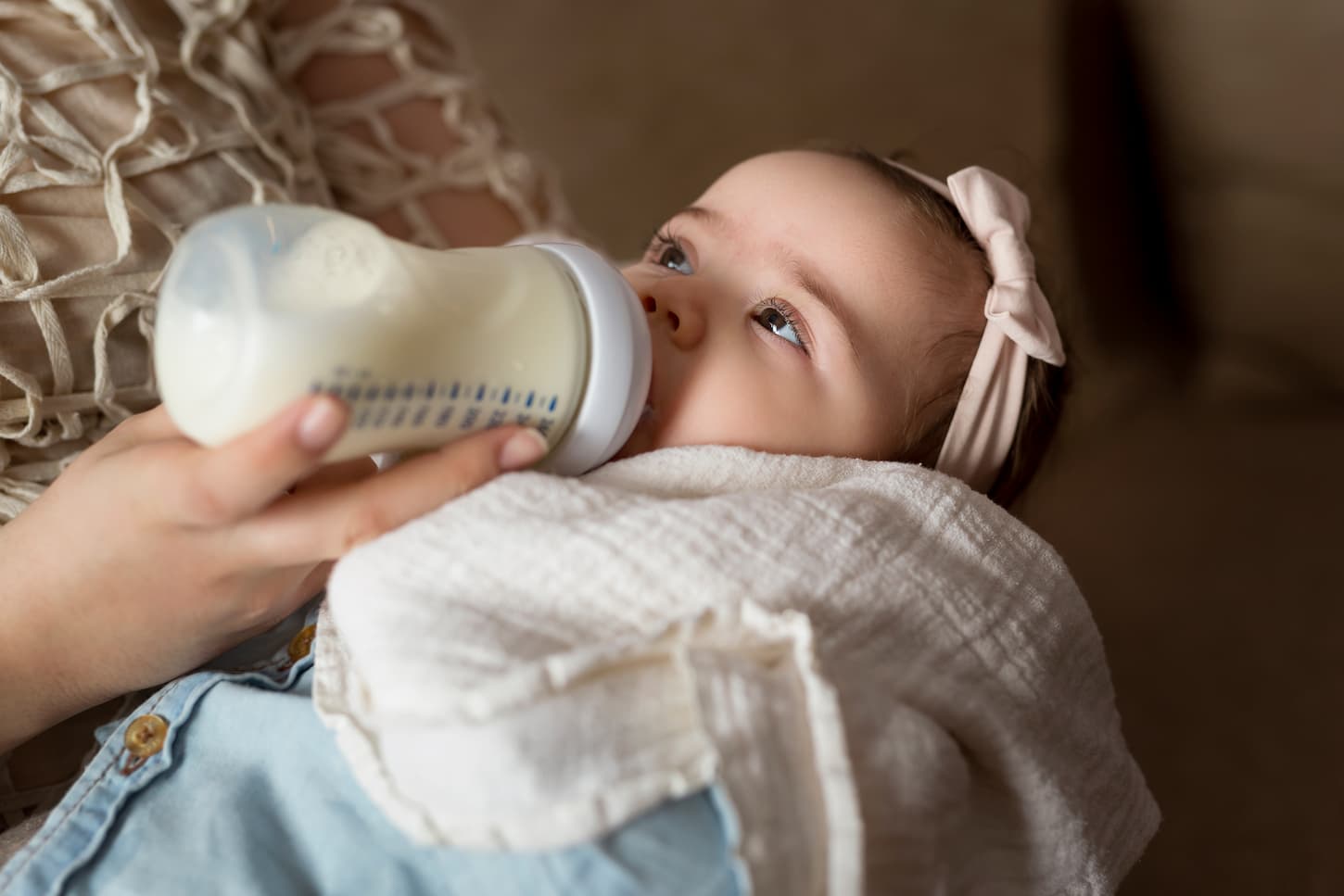Parenthood is amazing – and so is the new baby smell. Unfortunately, it comes with a lot of anxiety about every little detail. And when you’re stressing about waking up a sleeping baby, feeds go from small detail to a huge one. So what happens if your baby skips a feeding?
If a baby skips a feed, they may need to be woken up to eat or they may simply be hungrier at the next feeding. Newborns shouldn’t go more than 4-5 hours between feeds. Older babies may be able to go longer periods of time between feeds, or even skip a feed during the night.
Sometimes you’ll be able to get your baby to eat with a dream feed – meaning you can feed them and they’ll stay asleep. Other times, they’ll wake up – and then it will be a whole ordeal. Even so, let’s dive into what to do when your baby skips a feeding.

Can a Baby Skip a Feeding?
Whether or not a baby can successfully skip feeding will depend on their age, weight, health conditions, and developmental age. It will also depend on if they’re awake or asleep.
Babies who were born prematurely, are underweight, have certain health conditions, or are developmentally behind their same-aged peers will probably have less success skipping any feeds. In fact, they may not be able to skip any meals.
On the other hand, if you’ve got a chunkier, older, or totally healthy baby, then they may be just fine to sleep through a meal.
On that same note, if a baby is awake, then they may only be able to delay a meal, not skip it. They may want that meal later – like when they’re finally ready to calm down and take a nap. However, if they’re asleep, then they may be able to skip a meal – if they’re physically capable of doing so.
Now, just because a baby can skip a feeding doesn’t mean they will. My babies were all plenty chubby and capable of skipping a meal. But for several reasons, they wouldn’t skip a meal unless they were super-soundly asleep.
What Happens if Baby Skips a Feeding?
If your baby does skip a feeding, one of two things is most likely to happen.
- They’ll sleep through it. And when they do wake up, they’ll be really hungry.
- They won’t sleep through it. They’ll wake up and be hungry.
It’s also possible that your baby will sleep for a little bit – and then still wake up. Or they may sleep for a good chunk – and then still wake up before the next feed would normally be.
Sometimes, it’ll feel like they’re trying to confuse, trick, or just plain torture you. And that’s totally normal. Babies who can usually skip one nighttime feed may not be able to once they hit a growth spurt. But that’s getting into the next area of this topic, so let’s step back and talk about how you can know if your baby can skip feeds yet.
How Will I Know if My Baby Can Skip a Feed?
There are some great guidelines about when your baby may be able to skip feedings. However, I’ve found that they are just that: guidelines. They aren’t hard-and-fast rules. Instead, remember that what works for one baby won’t work for another.
In any case, here are some of those general guidelines.
- By four months, some babies can start sleeping for 4-8 hours at a time.
- By six months of age, more babies can start sleeping up to 8 hours at a time.
- By a year old, most babies can sleep 8-10 hours at night without a feeding.
Part of the way you’ll know that your baby can skip a feed (especially at night) is if they’re getting enough nutrition during the day. And a big component of getting enough calories during the day is solid foods.
So once your baby is eating a good variety of calorie-rich, healthy foods, then they’ll be able to go longer at night without missing a meal.
Now – can your baby ever skip a daytime feed? No – I don’t ever recommend you try that. Why? It’s because babies need a certain threshold of nutrition. And if they don’t get it during the day? They’ll let you know at night – and it’ll be an awful experience for everyone.
Is it OK if My Baby Misses a Feed?
Skipping or missing a feed will be okay for some babies, while it will be too dangerous for others. It’s really going to depend on your baby, your circumstances, and your baby’s overall health.
For most babies, though, a single missed feed usually won’t be a huge deal. Odds are, though, that they may need their next scheduled meal a little bit earlier than usual. They may also be more hungry and want to eat more.
It may also take a few meals or feeds for your baby to feel sufficiently “caught up,” as it were.
What Do I Do If My Baby Doesn’t Want to Feed?
If your baby doesn’t want to feed, then there’s not really a whole lot you can do about it, other than move their feeding to another time. Maybe they’re too busy playing or watching someone make faces at them. Or perhaps they just need that extra 15 minutes of beauty sleep. Delay the bottle or meal by a few minutes – and then try again.
Now, that’s assuming that there’s no underlying medical reason that’s making it absolutely necessary that your baby eats every feeding. If that’s the case, your doctor should give you some things to do if there’s a skipped meal. At the very least, make sure you call the doctor’s office to get advice.

How Long Can My Baby Sleep Without Feeding?
By about 4 months of age, some babies can sleep as long as 8-12 hours without a feed. That’s kind of a huge range, though, and that’s on purpose. That’s because every baby is so different – and there are a host of factors that can influence how long they can go without feeding while sleeping.
So it’s possible that your baby can go sleep all night (a solid 12 hours) without eating and be just fine. However, from what I’ve seen, it’s more like 6-8 months before a baby can do that.
And even then, my children were closer to 12 months (or older) before they were willing to consider losing their last nighttime feeds. By a year old, though, babies are generally safe and fine to sleep all night without a feeding.
By that age, it’s more about comfort, companionship, and maybe a few extra calories. And then nighttime nursing will be a decision for you to make between you, your parenting partner, your children, and your healthcare providers as needed.
Related Questions
When can I end nighttime feedings? Nighttime feedings can end when your baby no longer needs to eat every few hours and they can sleep all night. For some babies, this happens as early as 4 months old, though it may take up to 12 months old for others.
Do I need to prop my baby up to sleep? Babies only need to be propped up to sleep if they are ill or if their doctor recommends it for reflux. For more information, read my full article on propping babies up here.
Is it normal for babies to sleep in weird positions? Babies and toddlers are flexible and can sleep in odd-looking positions so long as they can breathe without snoring. Read more about how to make sure your baby is safe when sleeping in weird positions by reading my article here.